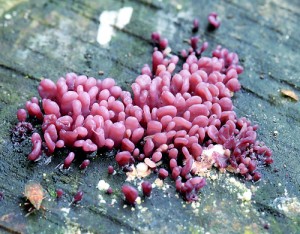Sunday Times 2
Could mushrooms save the world?
View(s):Fungus can be used to make bread and beer, but few people might imagine it could play a key role in creating safer insecticides, medical implants or green fuel.
But a group of scientists who are fans of mushrooms and their other spore-producing relatives believe we could be entering the ‘Age of the Fungus’ – and it could help save the world.
Most of a mushroom’s power lies beneath the soil in a bundle of filaments called that mycelium that secrete enzymes capable of breaking down soil and rocks. They also produce potent chemicals to defend their territory, and release nutrients into the soil.

Gary Strobel, a microbiologist at Montana University, Bozeman, has developed a biofuel after discovering a wood-decaying fungus called Ascocoryne sarcoides (pictured) that has volatile compounds comparable to the type found in diesel fuels. He turned them into biofuel, which he has tested in his motorbike (© CC BY-SA 2.0 'Ascocoryne sarcoides, Purple Jellydisc' by Stu's Images)
And it is this mycelium that is of predominant interest to mycologists, who believe mushrooms could be used to produce superior drugs and green materials of the future, New Scientist’s Richard Webb reported.
Gary Strobel, a microbiologist at Montana University, Bozeman, has developed a biofuel after discovering that a wood-decaying fungus called Ascocoryne sarcoides contains volatile compounds comparable to the type found in diesel fuels.
Dr Strobel worked with the ‘jelly drop’ mushrooms to turn what he described as ‘dead leaf matter’ into biofuel, which he has since tested in his motorbike.
Unlike biofuels made from fermented crops, the fungus-derived fuel could be made from agricultural waste and Dr Strobel is keen to commercialise the idea.
And Eben Bower, CEO of Ecovative, believes he can take the idea a step further – with a car made from fungus.
Mycelium is a flexible polymer, like plastic, which is biodegradable and can be persuaded to grow into different densities to produce a variety of materials with different properties.
His company already supplies mushroom packaging to Dell computers called EcoCradle, which acts as a subsitute for polystyrene, which is not very environmentally friendly.
It uses agricultural by-products like husks and plant stalks from rice, buckwheat and cottonseed combined with mycelium to grow the material.
Bower is now working on making synthetic bone made using mycelium as a scaffold, as well as moulded parts for electric cars and fire-resistant insulating foam.
The company is creating a sustainable surfboard made from mushrooms and is working with partners to create materials with ‘unique performance properties’ to meet specific needs.
Paul Stamets, mycologist and adviser to the Programme of Integrative Medicine at the University of Arizona’s College of Medicine, has 30 mushroom-based patents for environmental and medical devices, with his company Fungi Perfecti.
His stand-put idea is ‘mycorestoration’ which involves adding groups of specific fungi to soil to clean up contamination and speed up the amount of carbon absorbed to help mitigate climate change.
He also believes that Laricifomes officinalis can be used to make ‘universal insecticide’.
© Daily Mail, London


